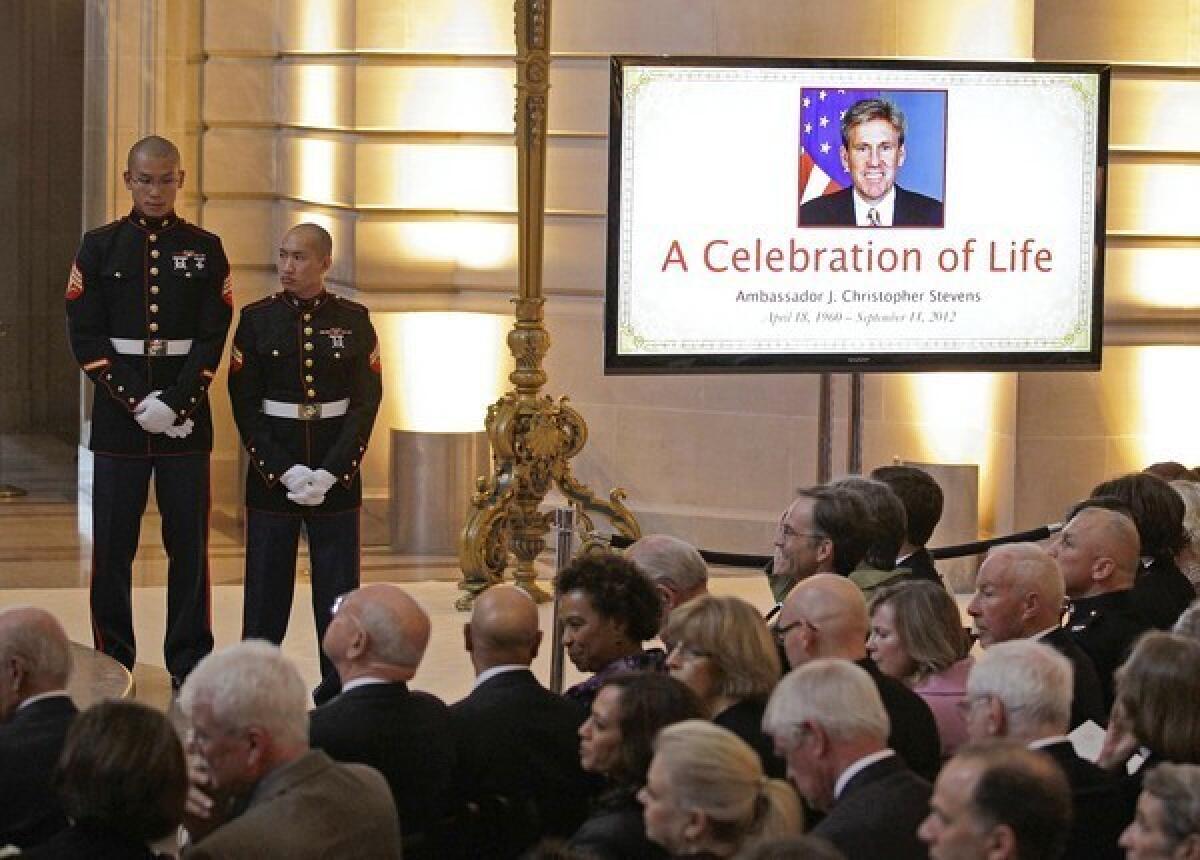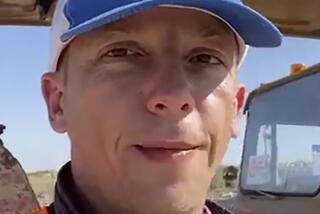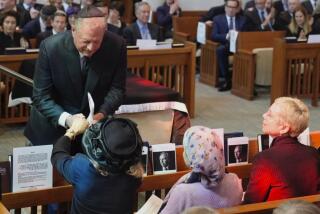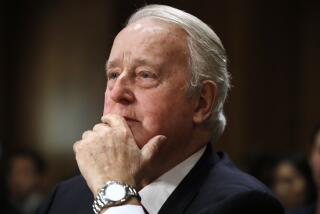Slain Ambassador Stevens remembered by family and politicians

SAN FRANCISCO — In the weeks since Ambassador J. Christopher Stevens was slain at the U.S. consulate in Benghazi, many have lauded him as a model diplomat, skilled linguist and sincere friend to the Libyan people.
In a ceremony hosted by his family Tuesday under this city’s majestic City Hall rotunda, the 52-year-old was remembered more for personal acts of persuasion and good-natured mischief.
There was the time he persuaded his younger brother, then 5, to strip naked, don a ski mask and “streak through the neighbors’ family room while they were all watching TV,” Tom Stevens recalled.
There were the stealth assignments he gave his youngest sister — now Hilary Stevens Koziol — to stick carrots up Tom’s nose while he was sleeping.
And UC Berkeley fraternity brother Steve MacDonald shared a tale of an uncharacteristically irate Stevens who, fed up with loud late-night neighbors, doused them with a fire extinguisher. Stevens then failed to correct his targets when they came charging after MacDonald instead.
“That was a failed diplomatic effort on his part,” MacDonald dead-panned to a crowd of hundreds that included friends, neighbors, dignitaries and admirers.
But time and again the tales centered on traits that seemed to make up the primary colors of Stevens’ character: intelligence, humility and an optimistic curiosity about the world and its inhabitants.
“He believed in the value of every person’s story,” said younger sister Anne Stevens Sullivan, noting if the pair got into a department store elevator, Stevens would be chatting up a fellow rider by the time they got out.
Tuesday’s event, billed as a celebration of Stevens’ life and coordinated by the office of San Francisco Mayor Ed Lee, drew politicians including Sen. Dianne Feinstein (D-Calif.) and U.S. Reps. Jackie Speier (D-Hillsborough) and Barbara Lee (D-Oakland), whose district includes Stevens’ East Bay hometown of Piedmont.
Addressing those gathered were Libyan Ambassador to the U.S. Ali Aujali and retired diplomat Thomas Pickering, appointed by the State Department to investigate whether missteps in Washington contributed to the slayings of Stevens and three other Americans by extremists Sept. 11.
The death of Stevens set off election season finger-pointing over security at the consulate. But here on his home turf, politics took a back seat Tuesday.
Stevens was born in Grass Valley. His mother was a cellist, his father a lawyer. From his mother, Stevens inherited a love of travel and learned the importance of talking to people in their own language, sister Anne said. From his dad, he received “a deep appreciation for history and a love of nature.”
While at Piedmont High School, Stevens participated in a summer exchange program in Spain. He studied French while at UC Berkeley and learned Italian before joining the Peace Corps — where he taught English in the mountains of Morocco and became fluent in Arabic.
While Stevens was “usually the smartest guy in the room,” MacDonald said, “he never comported himself that way.” He also knew how to live in the moment, plucking MacDonald out of his stressed-out study panic to take a break, “go play a game of backgammon on the balcony and enjoy the view,” his friend recalled.
After studying at UC Hastings College of the Law in San Francisco, Stevens in 1992 joined the Foreign Service, launching a career that included stints in Cairo, Damascus and Jerusalem. In 2007, after the U.S. resumed relations with Libya, he helped rebuild the U.S. Embassy in Tripoli. During last year’s insurgency, he served as America’s envoy to the Libyan Transnational Council. He was confirmed as ambassador in May.
Aujali on Tuesday called Stevens a hero who would never be forgotten for his support of the revolution.
“You sent us one of your best diplomats,” he said. “We are sorry we could not protect this diplomat when he came to help us.”
Pickering also lauded Stevens’ “critical work in opening up Benghazi” — where, he said, the envoy had made so many friends that young men on the streets would call out “Hi, Chris” in greeting.
Pickering recalled how a photo of the lanky ambassador ordering a glass of juice at a local cafe went viral, as people were “so amazed at a high-ranking official doing mundane business without a large entourage.”
Stevens was always “calm and steady,” his brother said, preferring a firm handshake and a “see you next time” to emotional goodbyes.
“So, my big brother, my best friend,” Tom concluded, “I’ll see you next time.”
More to Read
Start your day right
Sign up for Essential California for news, features and recommendations from the L.A. Times and beyond in your inbox six days a week.
You may occasionally receive promotional content from the Los Angeles Times.







